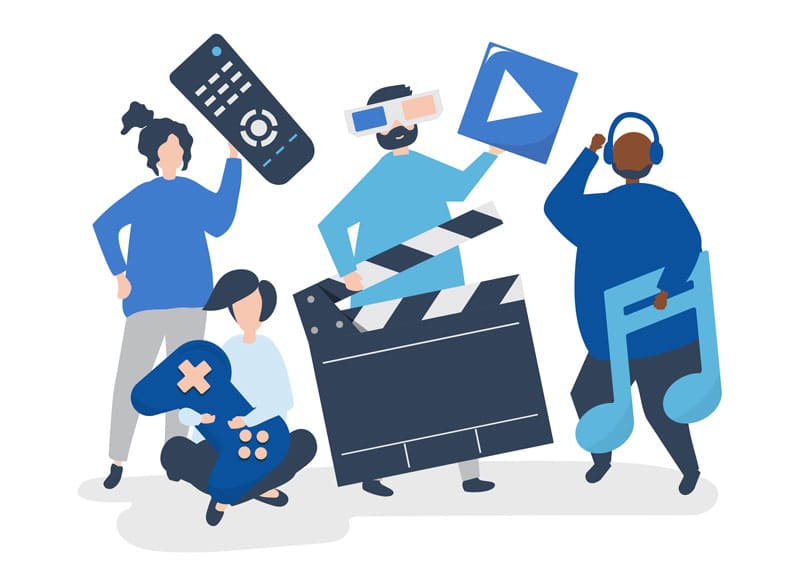---
The world of sport generates a large economic market, including eSports
For the modern-day football professional it is essential to recognise that the sports industry is no longer just about the match and the players, the industry has shifted into a variety of new frontiers in technology, commerce and social media. The elite clubs are striving to be more than just a successful football club, but a commercial enterprise with a thriving global pulse. The incorporation of virtual reality, content production, and eSports into a club's blueprint plan are a few of the technological areas at the beginning of this expansion that combines sport and entertainment.
Some elite clubs have responded to these market demands by creating in-house media subsidiaries, with their own platforms and OTTs to take ownership of their media content in order to build a digital portfolio. For example the FCB Digital & Media Lab (FC Bayern Munich) and more recently the Barça Studios (1). As clubs are successful in their social media efforts, they improve their brand value worldwide, which means more commercial revenue and new sources to profit. Clubs are aware of the impact that social media has in the present, therefore, they are engaging into new pathways in order to adapt to the new tendencies and tastes of the audience. Millennials play a big part on this global expansion, as techonoly and media content is a part integrated into their culture, forcing the clubs to partner with companies that exploits this trends.
The most successful football professionals will be those who evolve with these technological trends and support their clubs in commercialising their business models, investing in new technologies, and creating ways of revenue within this new world of Sportainment, that as its name shows, is the combination of Sports and Entertainment as a new .source of revenue. In this everchanging world, having talent is not good enough anymore, football professionals need to be a whole package for their clubs, being able to play good and being able to create a brand that the audience can relate with the club, that's the key to success in Sportainment.
Take home
The modern day football professional needs to become skilled within the world of commerce, eSports, virtual reality and digital creation to become exponentially more valuable in the Sportainment industry.
Full article
The Trends in Sportainment
Transforming into Commercial Enterprises
Football clubs have been shifting their attention to matters extraneous to football and investing commercially with the objective of professionalising and diversifying their revenue streams. Specifically, clubs are increasingly employing more and more commercial professionals, marketing experts, and data analysts, who may lack an understanding of football, but excel in their knowledge of business, entertainment and communication (2). The aforementioned media hubs are a perfect example of the increasing employment opportunities for commercial experts in football. These commercial professionals offer a different vision to the traditional football employee and for this reason they are the most in demand in the marketplace right now.
This shift represents an overall professionalization of the industry, Miriam Carreño, the head of the human resources department at Real Valladolid, explains that, "[I]n general, the football industry has traditionally had a business model in which clubs had little structure, where we all do everything and work on everything. And it's clear that it's not the right model"(3) .
For a football club the incentive of commercialisation is having a greater capability to spend money acquiring the best players in the market. According to the Deloitte Football Money League, 40% of the total $9.25 billion in revenue earned in 2018 by the top 20 football clubs was derived through commercial sources. Generating commercial revenue supports paying high transfer fees without having to sell players. This allows the team to achieve the best results on the pitch and subsequently, the football club's brand strengthens and the fan-base expands further. Thus, this commercial investment creates a sustainable cycle of growth through a synergy of sports and entertainment.
The eSports Expansion
The elite sports organisations around the world are expanding into eSports and trying to capture market share early before the rest of the industry realises the overwhelming value of this emerging market. The figures support these clubs' belief that investing in eSports is a wise business decision, in the past two years the eSports industry's revenue has risen 38% to $905 million and reports from Goldman Sachs and PwC have projected a further increase of between $1.58 billion and $2.96 billion by 2022 (4).
According to Activate, 62% of US eSports viewers are aged 18-34, so for sports teams, creating an affiliation between their brand and young eSports fans early will help provide long-term financial security (5) . Those looking to become sports-marketers should take note as capturing the shorter attention-span of millennials is proving to be one of the most challenging tasks for companies. The football clubs' interest in eSports is growing rapidly also, in 2018 Manchester City FC became the first English top flight team to invest in the exponentially larger eSports market in China. Wolverhampton Wanderers FC have since joined the race to grab market share of eSports in China by partnering with one of the most high-profile eSports teams in China, Weibo - whose ownership is connected to Sina Weibo a social media platform with over 445 million daily users (6).
Partnering with eSports companies opens the possibility of sponsorship from brands that previously would have received less value in forming a connection with the club. Manchester City FC recently signed a deal specific to the eSports market with Turtle Beach, a company for gaming headsets and audio accessories. This is a perfect example of a partnership that previously would have made no financial sense without the existence of an affiliated eSports team.
As the industry's complexity grows larger there is a corresponding need for skilled sports lawyers
Due to the explosion of an undefined eSports market, the rights of the clubs, the sponsors and the eSports athletes are developing rapidly into new and uncertain territories. As the industry's complexity grows larger there is a corresponding need for proficient sports lawyers who understand the elements of jurisdiction, image rights, termination agreements and value of these eSports contracts in both a sporting and a commercial sense. To navigate such a dynamic legal environment football clubs and their affiliated eSports clubs, athletes, and the companies involved require the legal services of a multidisciplinary team to ensure the protection and promotion of their rights.
Virtual Reality Integration
The world of football is accustomed to being the stage upon which new technologies emerge to the public. From the advent of the television, to live streaming games on mobile devices, new frontiers are being constantly being pushed that change the landscape of how fans consume the 'beautiful game'. The next such frontier is virtual reality. One limitation for clubs trying to expand globally comes from being unable to provide the match-day experience for fans that cannot reach the stadium. Traditionally, clubs have attempted to bridge this gap by travelling around the world for preseason games to showcase their players to an international audience. However, virtual reality may provide a faster, more efficient answer to this dilemma by bringing the stadium to the fan.
The next frontier is the virtual reality
In the United States, teams like the LA Rams integrated virtual reality into their marketing repertoire a year ago by giving season-ticket buyers the opportunity to view their seats in the stadium through a virtual simulation prior to purchasing them (7). The Levi's Stadium, home to the San Francisco 49ers, is widely considered to be the most high-tech stadium in the world as it offers free high speed Wi-Fi, a guide to take the fan to their seat, a route to the toilets with the shortest queue and the option to have food delivered to straight their seat. Now, football clubs like Liverpool FC are using the same technology to bring the stadium to the fan with the "Anfield Stadium 360 Virtual Tour". (8)
Liverpool CEO Peter Moore explains that with 771 million fans worldwide, most of whom will never make it to Anfield, virtual reality can help bring the stadium experience to Liverpool's global audience (9) . Virtual reality technology is simultaneously being integrated into Liverpool, and other Premier League clubs, as a training mechanism to improve their player's mental game and tactical awareness (10) . These modifications represent just the beginning of the expansion of virtual reality in football.
A myriad of legal implications arise if clubs start replicating an opposing player's image and data in a virtual reality setting, particularly when the nature of the virtual reality use shifts from gaining a competitive advantage in training to a commercial one through sales. This is another element of the industry that football professionals need to be aware of.
Data Analytics, Social Media and Content Production
Virtual reality is just one type of technological investment that football clubs are making.
Through investing social media data analytics, clubs are beginning to align the brands they partner with to the interests of their fan base. Companies such as Zoomph, Flye and Blinkfire Analytics are providing clubs with advanced analysis of their fan's demographics, preferences and levels of engagement. This process is maximising the value that brands receive from partnering with the club, and for the club, they benefit from forming corporate partnerships tailored to their fans. Consequently, the club is able to sell their brand for a higher fee by showing the partnering company that they can reach and truly engage with their target audience.
Through investing in social media data analytics, clubs are beginning to align the brands they partner with the interests of their fan base
The massive £313.6 million that Premier League clubs received last year alone in shirt sponsorships is an indication of how high the Premier League brand is valued today, and with 9 out of the 20 Premier League clubs aligned with sports betting websites the importance of having an overlapping target audience is evident (11).
The ultimate commercial goal for a football club should be globalisation; through turning their brand into a commercial product that their fans consume worldwide, the club becomes able to sustain alternative models for growth. The production of content helps these clubs disseminate their brand worldwide and gain notoriety in places where fans have never seen their stadium.
The ultimate commercial goal for a football club should be globalisation;by turning their brand into a commercial product that their fans consume worldwide
Two effective ways clubs are increasing brand recognition is by engaging with fans through social media platforms and creating television shows such as "All or Nothing: Manchester City", "First Team: Juventus", and "Sunderland 'Til I Die".
This global notoriety directly impacts the club's overall value. As of today, the correlation between the football clubs with the top 10 most social media followers and the top 10 most valuable football clubs worldwide is identical, with the exception of Tottenham Hotspur FC beating Paris Saint-Germain (ranked #11) as one of the top 10 the most valuable clubs but not appearing on the list of top 10 clubs with the most followers (12). FC Barcelona recently took one step closer to their goal of globalisation becoming the first football club to reach over 1 billion interactions through social media and this achievement is just the beginning (13).
While the debate is ongoing for the best player of all time, Cristano Ronaldo undoubtedly is the most socially impactful player of all time. He currently holds the #1 spot for the most followed individual on Instagram in the world, and is 55 million followers ahead of Brazilian footballer, Neymar at #2 for the most followed footballer (14). His move from Real Madrid CF to Juventus FC had an incredible social and financial impact. On the day Ronaldo joined he brought 1.5 million new followers to Juventus's social media channels and his transfer caused share prices in the Italian club to more than double from $0.81 to $1.84 within his first two months at the club (15). Executives refer to this impact as the "Ronaldo effect" (16). The Ronaldo effect was also felt in the Serie A, the BBC estimated that the TV rights of the league became "worth 20 to 30% more" following his arrival. Ronaldo obviously impacts the strength of Juventus in a footballing sense, but it is his social presence and cultural significance that has made his move so significant commercially.
The Ronaldo effect demonstrates that the athletes' prominence in the industry is at an all-time high, and now their decisions are determining the trends in the market. For the first time players are the new players.
The argument can be made that the club or player's value is based solely on their on-pitch success and that the followers simply 'follow' this success, however, I see the emphasis on building a social presence as another cyclical structure in which the greater the social media initiative, the greater the increase in the overall value of the business which feeds into further success on the pitch.
Conclusion
The 90 minutes on the pitch will always remain crucial to a club's success in the industry, but to be a complete football professional, individuals must be ready to provide the clubs with expertise in matters outside of football.
The modern day football professional needs to become skilled within the world of commerce, eSports, virtual reality and digital creation to become exponentially more valuable in the Sportainment industry. The internet and television were just the beginning, the future is right here and right now, with social media and digital content taking us to unknow paths were only the most creative individuals will know how to venture.
- (1) http://www.sportspromedia.com/news/barcelona-barca-tv-content-production-house
- (2) https://johancruyffinstitute.com/en/blog-en/football-business/football-needs-new-professional-profiles/?utm_campaign=shareaholic&utm_medium=whatsapp&utm_source=im
- (3) https://johancruyffinstitute.com/en/blog-en/football-business/football-needs-new-professional-profiles/?utm_campaign=shareaholic&utm_medium=whatsapp&utm_source=im
- (4) https://www.emarketer.com/content/esports-disrupts-digital-sports-streaming
- (5) https://digitalsport.co/five-reasons-why-football-teams-continue-to-invest-in-esports
- (6) https://www.wolves.co.uk/news/club/20190227-wolves-esports-partners-with-weibo-to-launch-esports-team-in-china/
- (7) https://www.forbes.com/sites/leighsteinberg/2018/07/31/virtual-reality-the-forefront-of-the-tech-wave-sweeping-over-sports/#7a472a2d23e8
- (8) https://3ddigitalvenue.com/3dmap/clients/liverpool/
- (9) https://www.forbes.com/sites/forbesinsights/2019/07/19/what-liverpool-football-club-yes-not-soccer-can-teach-us-now-about-essential-fan-experiences-for-the-future/#7886fbaf1acb
- (10) https://www.telegraph.co.uk/football/2019/04/24/premier-league-footballers-train-virtual-reality-welcome-future
- (11) http://www.sportspromedia.com/analysis/premier-league-preview-2018-19-sponsors-kit-deals-every-club
- (12) https://www.fourfourtwo.com/features/most-valuable-football-clubs-forbes-manchester-united-city-chelsea-arsenal-liverpool-tottenham-real-madrid-barcelona
- (13) https://twitter.com/Fernandopluri/status/1154056384444620800/video/1
- (14) https://influencermarketinghub.com/top-instagram-influencers-in-2019/
- (15) https://www.businessinsider.com/juventus-fc-stock-has-doubled-in-the-cristiano-ronaldo-era-and-its-probably-only-the-beginning-2018-9
- (16) https://www.ft.com/content/cc72b6a6-b5b9-11e8-b3ef-799c8613f4a1
Comments
Related links
Main menu

















